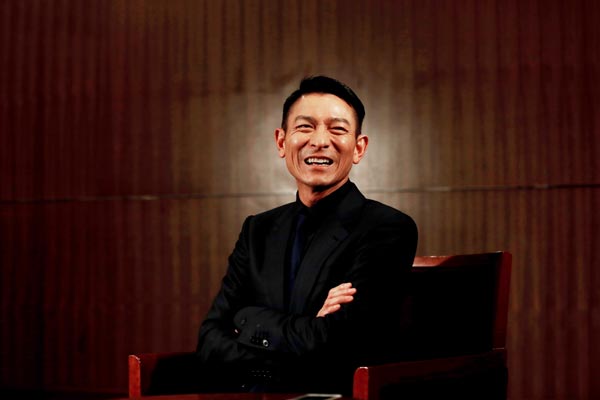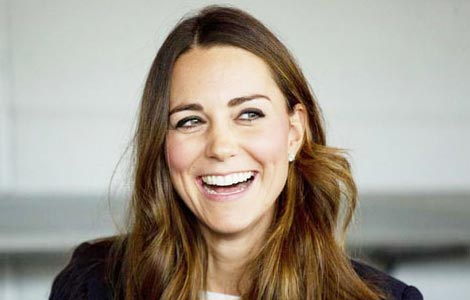Taking risks in a firestorm
Updated: 2013-11-06 01:09
By Liu Wei (China Daily)
|
||||||||
 |
|
Hong Kong superstar Andy Lau promotes his new movie Firestorm in Beijing. He is the leading actor, producer and co-investor of the movie. Photos by Jiang Dong / China Daily |
Showbiz sensation star Andy Lau is well known for his acting and music career, but as Liu Wei discovers, he is also an ambitious film producer who is willing to take risks, physical and financial.
In his new film Firestorm, to be released on Dec 12, 52-year-old movie star Andy Lau jumps from the 11th floor of a building in Central, the business center of Hong Kong.
It is a stunt he managed to pull off despite his acrophobia — he even hates roller coasters.
"I don't know why people pay others to get scared,' he jokes.
The film, the directorial debut of former scriptwriter Alan Yuen, had Lau finding himself doing a number of hair-raising stunts, such as rushing among the hustle and bustle of Central, holding a machine gun.
The singer and actor known as the "heavenly king" of the Hong Kong entertainment industry does not have to do the stunts himself, but he loved the script and as producer and co-investor he was conscious of keeping costs down.
"To use stunt men means more money. I would rather use it on protecting our actors," he says.
The film's other investor is Bill Kong, an established producer behind the success of Ang Lee's Crouching Tiger, Hidden Dragon and Zhang Yimou's Hero.
This is not the first time Lau has supported a new director.
With 146 films, more than 100 albums and 300 concerts, Lau is no doubt a show business all-rounder, but he is also a producer with a philanthropic bent.
He initiated the Focus: First Cuts project in 2005 and has invested in more than 10 projects of young directors. Some of them have been very successful, such as mainland director Ning Hao, who received 4 million yuan ($640,000) from Lau to direct Crazy Stone. The black comedy grossed 20 million yuan and was the most acclaimed domestic film of that year. Ning is now a household name.
In 2011 Hong Kong director Ann Hui brought her script A Simple Life to Lau. The story of the last days of an old maid and the son of her master did not appeal to most investors. Lau, however, was touched by the effortless story between ordinary people.
The film won critical and popular accolades, winning lead Deanie Ip the best actress award at the Venice Film Festival that year. Lau recouped his investment from the mainland and Hong Kong box office takings and the film's overseas copyrights.
As an investor, Lau prefers down-to-earth directors and original stories.
When he first saw the script of Crazy Stone, it was named Diamond. Ning said he needed 8 million yuan. Lau told him First Cuts could afford only 4 million yuan for every director. Ning's immediate answer was: "OK, 8 million for diamond, 4 million yuan for stone." He changed the storyline from revolving around a diamond to a piece of fake jade.
"This is what I call a down-to-earth director," Lau says.
Every year Lau receives about 300 scripts. His assistant will read them and write a summary of each script, listing its genre, important scenes and target audience. The summary is usually more than 1,000 words. Lau will pick up about 15 scripts according to the summary and read them himself.
"It is hard to define a genre I favor," he says. "But I like films I have never seen before in this market."
Take Firestorm, the first Hong Kong cop thriller shot in 3-D.
Shooting in 3-D enhances the action, but requires more money. Bill Kong is known for his strict control of a budget. Lau used HK$500,000 ($64,503) of his own money to make a 3-D trailer as a demonstration to persuade him.
While an actor is only responsible to his director, a producer and investor have more people to answer to.
In Firestorm, Lau did something that has never before happened in Hong Kong films — put an explosion in Central.
"In Speed, a film shot 20 years ago, they had had these impressive scenes inside the Metro of Los Angeles," he says. "Although the shots were filmed using a miniature model, they were very imaginative and exciting. Filmmaking is about dreaming of things impossible."
But the area is only available to filmmakers between 8 am and 11 am on weekends. To shoot the scene the crew needed to shoot and then wait for 15 weeks. It was too long in-between.
Lau went to Kong to persuade him to build a set in a deserted airport, which cost HK$15 million.
"The first thing he said to me was, ‘half of the cost will come from my pay packet'," Kong recalls.
Lau was not a wise investor at the beginning of his behind-the-scene career. He would rather call himself a "dumb kid", the name of one of his hit songs.
Contact the writer at liuw@chinadaily.com.cn.
- Film 'Firestorm' hits screen on Dec 12
- Highlights of pop star Andy Lau's concert tour in Nanjing
- Top-notch actor and producer invest in 3-D Firestorm
- Andy Lau promotes upcoming 'Firestorm' in BJ
- China Exclusive: Domestic films panned but still profitable
- New Chinese film depicts Gaokao pressure
- Domestic adventure tops China's box office

 Post-baby Duchess
Post-baby Duchess
 Victoria Beckham S/S 2014 presented during NYFW
Victoria Beckham S/S 2014 presented during NYFW
 'Despicable' minions upset Depp's 'Lone Ranger' at box office
'Despicable' minions upset Depp's 'Lone Ranger' at box office
 'Taken 2' grabs movie box office crown
'Taken 2' grabs movie box office crown
 Rihanna's 'Diamonds' tops UK pop chart
Rihanna's 'Diamonds' tops UK pop chart
 Fans get look at vintage Rolling Stones
Fans get look at vintage Rolling Stones
 Celebrities attend Power of Women event
Celebrities attend Power of Women event
 Ang Lee breaks 'every rule' to make unlikely new Life of Pi film
Ang Lee breaks 'every rule' to make unlikely new Life of Pi film
Most Viewed
Editor's Picks

|

|

|

|

|

|
Today's Top News
China seeks collaborative efforts on nuclear safety
Alipay partners with UATP
US media under attack for 'double standards' on terror
Govt to focus on better service
Cyber minister proposes security fix
Canadian province closes debt issue in HK
US will keep its edge: Hagel
Franchisors to follow KFC’s lead
US Weekly

|

|







